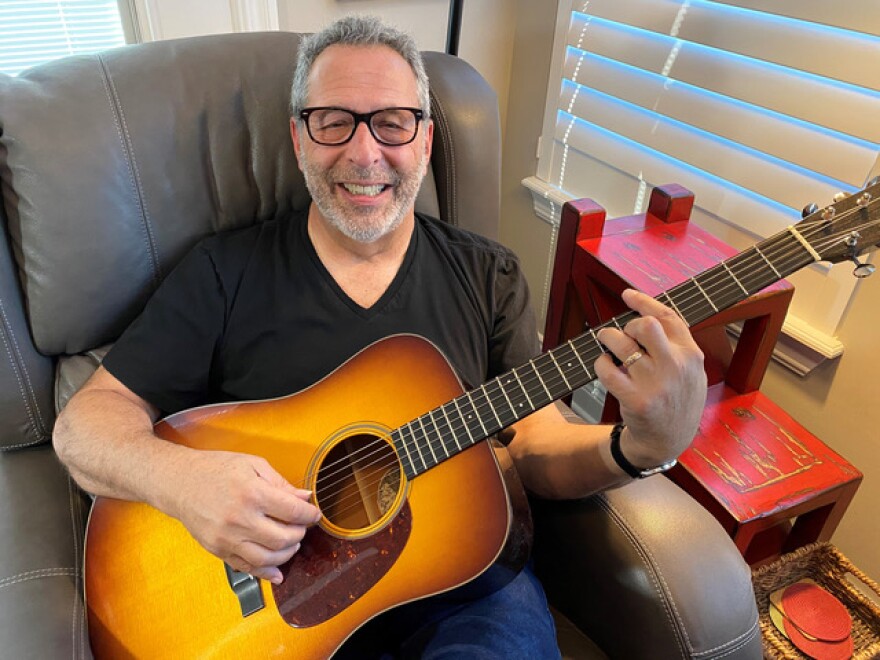Steve Litwer spent a lot of his life feeling embarrassed about having been raised by a parent with a mental illness. The retired media sales executive says that even into adulthood, his mother refused treatment for schizophrenia, a disease that traumatized him and his brothers.
Now, though, the embarrassment has waned enough that Litwer was able to write and publish a book, The Music Between Us, sharing intimate details with anyone who’d like to read them.
Far down his road to recovery and self-acceptance, Litwer started volunteering to play the guitar for hospice patients around Kansas City. He had no idea the activity would be crucial to mending what had always felt broken within him; he calls it “healing from those who cannot heal.”
“I’m not sure anybody can spend time with a dying patient as often as I have without contemplating their own mortality,” Litwer says. “As I did that, I started remembering pieces of my past that I had buried.”
Litwer says he’s not a writer and wasn’t out to write a book. He did, however, jot down a sentence or two about each visit he had with a patient. Some visits warranted more real estate in his journal—like the time he met a psychic—and before long he had entire sentences and paragraphs about many of his experiences.
Because spending time with hospice patients can feel daunting, Litwer thought what he’d recorded might prove useful; maybe other volunteers would benefit from accounts of his encounters.
He showed a writer friend the dozen or so stories he’d amassed. She said he had a book on his hands.
Litwer recalls his friend saying: “‘I think people would like to know why you’re doing this. Maybe this should be a story about your life and how you wound up here spending almost every afternoon with people who are dying.’”
It took him four months to gather the courage to sit down and tackle the project of connecting his own healing to his vignettes about people who would never heal.

The book includes details from 33 visits, each followed by reflections on Litwer’s life: the time he spent with his guitar as a small child and teenager; what his life was like after his father moved away from the family and into what amounted to a motel room; the guilt of being incapable of making a romantic relationship last very long during his 20s.
Both the personal reflection and spending time with dying people took some concentration. Litwer said he was initially kind of scared of both. His religious beliefs and studies of doctrines helped.
“Most great religious traditions have scriptures and most of them are very clear about helping people who are vulnerable. Usually it’s ‘help the stranger,’ ‘take care of the stranger.’ And you realize in your life at some point, if you introspect enough, that we’re all vulnerable strangers,” Litwer says.
He says he felt like a vulnerable stranger sitting with those who had fewer than six months to live. It was that very vulnerability, once he allowed himself to feel it, that helped him connect with the patients.
“There’s some mysterious thing that happens between people when one person steps out of themselves and provides some service to others,” Litwer says.
Many want the company as much as or more than the musical interlude he provides, which makes the pandemic a terrible challenge.
Litwer says, “That’s one of the problems today with COVID. Families and friends and volunteers cannot get into these nursing homes to see these patients.”
He does try to connect via platforms like Zoom, but it’s not the same.
One of this favorite stories from when he was able to visit in person is about an 80-year-old woman he calls Liza who had dementia and was in respiratory failure. Upon hearing the first few notes he strummed of a song by the Everly Brothers, the patient began shouting, “Donnie!”
After a great deal of questioning—and doubting—Litwer ascertained that she’d dated Don Everly when she was a teenager in Iowa.
He writes in the book that this experience was one of his earliest observations of music’s ability to reach deep, long-ago memories.
“Prompted by our conversation, these memories got very specific and resulted in recapturing the fondness she had experienced as a young girl in a relationship,” Litwer writes.
For that reason, he’s learned it’s sometimes better for him to play music that patients may be less familiar with. He throws original songs or ambient music into his mix of covers.
He forges connections with patients and connections to his own memories regardless of what he plays.
Litwer says, “Music is a great bridge between people, and I learned that it’s no less so with you or someone who’s sick or dying. It wakes people up, it awakens their memories, and it connects people.”





